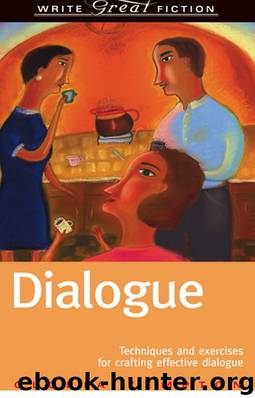Write Great Fiction--Dialogue by Gloria Kempton

Author:Gloria Kempton
Language: eng
Format: epub, mobi
Tags: epub, ebook
Publisher: F+W Media, Inc.
Published: 2004-06-11T16:00:00+00:00
8
[ BRAKES OR ACCELERATOR — DIALOGUE AS A MEANS OF PACING ]
“Let's see,” the small-town, slow-talking cop said as he stood outside my window.
It doesn't matter if he was slow talking, fast — talking, or a deaf mute — cops intimidate me.
“Looks like you were doing about sixty-seven in a fifty-five mile-per-hour zone. Well, I suppose I'll have to write you up.”
Whatever. Just hurry up so I can get back on the road and out of this humiliating moment sitting here in my car hanging out with you.
I can't believe it, I grumbled to myself as he returned to his patrol car to write me up. Almost twenty years without a ticket and here I am. I mean, really, I would have hit the twenty-year mark in another year or so.
“Okay, I'm just gonna make it sixty-five instead of sixty-seven so it'll bring your fee down a bit.”
“I haven't had a ticket in almost twenty years,” I told the cop, thinking this bit of trivia might make him swell with pride for me, resulting in a torn-up ticket. “Isn't that something?”
“That's something, all right,” he said as he handed me the ticket. “You gotta be careful around here because, you know, us small-town cops don't have nothing else to do but sit out here and catch folks like you hightailing it through our town like you got somewhere to go.”
This is a true story; I'm still feeling the pain of the $75 ticket. The point? I might have been speeding, but the minute I ran into Mr. Small Town Cop, my true story slowed right down. We weren't going anywhere fast. And that's simply because he wasn't in any hurry. You can't speed up a slow character; he moves in two speeds — slow and reverse. The same is true with a fast character — fast and fast forward. So it pays to know your characters because who they are determines how slowly or quickly they talk.
PACING YOUR STORY
Every story has its own pace. Most literary and many mainstream stories move slowly, easily, from opening to conclusion. Such a story may ramble on about the characters' philosophies and life strategies, and on occasion the author will even use dialogue to achieve the slow pace — if the author knows what he's doing. Reading slow-moving dialogue is preferable to reading lengthy passages of philosophical narrative.
Genre stories generally move quickly, employing more dialogue and action and less slow-paced narrative, because they are generally plot-driven rather than character-driven, like literary and mainstream stories. The emphasis is on the action that keeps the plot moving rather than the narrative that keeps the character growing.
Whatever kind of story you're writing, you want to be conscious of the pacing. It makes sense that a character-driven literary story will move more contemplatively than an action suspense story. Dialogue generally speeds things up, but of course there are exceptions, as there are exceptions to everything in fiction. For example, you might have a slow talker who, every time he appears in a scene, causes the action and other characters to just kind of come to a stop.
Download
Write Great Fiction--Dialogue by Gloria Kempton.mobi
This site does not store any files on its server. We only index and link to content provided by other sites. Please contact the content providers to delete copyright contents if any and email us, we'll remove relevant links or contents immediately.
Asking the Right Questions: A Guide to Critical Thinking by M. Neil Browne & Stuart M. Keeley(5766)
Autoboyography by Christina Lauren(5230)
Eat That Frog! by Brian Tracy(4529)
Dialogue by Robert McKee(4393)
Sticky Fingers by Joe Hagan(4193)
Journeys Out of the Body by Robert Monroe(3623)
Annapurna by Maurice Herzog(3465)
Full Circle by Michael Palin(3447)
Schaum's Quick Guide to Writing Great Short Stories by Margaret Lucke(3377)
Elements of Style 2017 by Richard De A'Morelli(3344)
The Art of Dramatic Writing: Its Basis in the Creative Interpretation of Human Motives by Egri Lajos(3064)
Atlas Obscura by Joshua Foer(2956)
Why I Write by George Orwell(2948)
The Diviners by Libba Bray(2932)
The Fight by Norman Mailer(2931)
In Patagonia by Bruce Chatwin(2924)
The Mental Game of Writing: How to Overcome Obstacles, Stay Creative and Productive, and Free Your Mind for Success by James Scott Bell(2908)
Venice by Jan Morris(2572)
The Elements of Style by William Strunk and E. B. White(2471)
